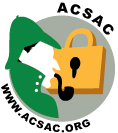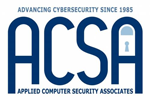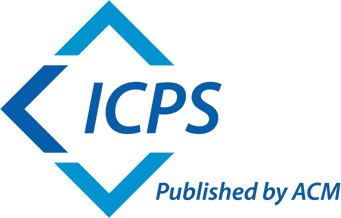Call for Submissions
ACSAC is an internationally recognized forum where practitioners, researchers, and developers in information system security meet to learn and to exchange practical ideas and experiences.
If you are developing practical solutions to problems related to the protection of users, commercial enterprises, or countries' information infrastructures, consider submitting your work to the Annual Computer Security Applications Conference.
We solicit submissions that address the application of security technology, the implementation of systems, and the discussion of lessons learned. While we are interested in a variety of topics, we especially encourage submissions in the area of our Hard Topic Theme for 2018, Big Data for Security.
Format Description Deadline Notification
(tentative)Technical Track peer-reviewed papers on new work June 15, 2018 11:59pm PST Aug. 23, 2018 Case Studies real-world security application reports June 15, 2018 Aug. 15, 2018 Panels interactive expert panels June 15, 2018 Aug. 15, 2018 Professional
Development
Coursesin-depth courses on new and emerging security topics June 15, 2018 July 19, 2018 Workshops 1-2 day sessions on hot topics June 15, 2018 Aug. 15, 2018 Posters new and innovative preliminary work Aug. 1 to
Nov. 15, 2018rolling Works in Progress short works-in-progress reports Sept. 15, 2018 Sept. 30, 2018 Conferenceships student grant requests Sept. 15, 2018 Oct. 15, 2018
Submission Formats:
Technical Track Paper Submissions (contact Program Chairs)
- Juan Caballero, IMDEA Software Institute (Program Chair)
- Guofei Gu, Texas A&M University (Program Co-Chair)
Hard Topic Theme
This year, ACSAC especially encourages submissions in the area of Big Data for Security. The security industry is rapidly amassing an incredible amount of information: billions of malicious samples and emails attachments, Internet-wide scans that can be repeated multiple times a day, collections of DNS queries and HTTP requests, and an unprecedented amount of open source software to mine for vulnerabilities are only the tip of the iceberg. This information allows researchers to observe phenomena that do not manifest on a small scale and can play an important role in many other aspects of security, from analytics and intelligence support, to training automated classification and reasoning techniques. However, using large datasets in security also faces many technical and scientific challenges. Therefore, we need to design new data-driven techniques and we need to rethink our existing solutions to take advantage of this vast amount of information to improve security. Submissions in this area include (but are not limited to) the use of machine learning and data mining techniques to explore and extract information from large datasets of security-relevant information, defenses against adversarial machine learning, and novel techniques to cluster and classify security data. They also include the presentation of new large-scale data collection and analysis techniques, and the discussion of longitudinal studies that bring new insights into attackers' behavior, or help researchers to better understand the evolution of a given threat.Artifact Submission
Security research is often criticized for the poor reproducibility of its results. Unfortunately, authors seldom release the software they develop and the datasets they use to perform their experiments. This makes it difficult to compare different solutions and force other researchers to undergo the tedious and error-prone task of re-implementing previous approaches and to compare solutions on different datasets, which may not be a fair comparison. To help improve this situation, ACSAC encourages authors of accepted papers to submit software and data artifacts and make them publicly available to the entire community. These artifacts are not part of the paper evaluation. Their submission is strictly optional and occurs only after a paper has been accepted - to prevent any influence on the decision process. Authors who decide to participate in this program will interact with a special committee dedicated to verifying the submitted artifacts (e.g., to test that source code compiles and runs correctly, or that datasets content match their description). Authors can decide what they want to submit (software, data, or both) and the verification procedure will take place in parallel with the preparation of the camera-ready version of the paper. The authors of the submitted artifacts need to commit to keep them available online on a publicly accessible website for a minimum period of three months between October and December 2018. We believe that this is an important initiative that can help the entire community increase its reputation, and make research in the security field proceeds faster by taking advantage of systems previously built by other researchers. Therefore, we plan to reward authors who participate in this program with a special mention during the conference and on the ACSAC webpage, a stamp of reproducibility on their papers, and (if enough authors participate to the program) by reserving a Distinguished Paper Award for this group.» Technical Track submission details and FAQ
Case Studies in Applied Security (contact Case Studies Co-Chairs)
- Larry Wagoner, NSA (Case Studies Co-Chair)
- Randy Smith, Boeing (Case Studies Co-Chair)
» Case Studies submission details and FAQ
Professional Development Courses (contact Professional Development Co-Chairs)
- Daniel Faigin, The Aerospace Corporation, USA. (Professional Development Co-Chair)
- Michael Clifford, Noblis NSP (Professional Development Co-Chair)
» Courses submission details and FAQ
Panels (contact Panels Chair)
- Suzanne McIntosh, New York University - Courant Institute and Center for Data Science (Panels Chair)
Panels should encourage audience participation and focus on the sharp edges of a topic where there is controversy or where there are widely varying positions. Panels focused on a topic related to the conference theme are especially welcomed, but this is not a hard requirement; some additional topics are listed here. A typical panel proposal should list the moderator, three panel members and an abstract of the proposed topic. Full details are provided on the Panels webpage.
» Panels submission details and FAQ
Workshops (contact Workshops Chair)
- Harvey Rubinovitz, The MITRE Corporation (Workshops Chair)
» Workshops submission details and FAQ
Posters (contact Posters Co-Chairs)
- Thomas Moyer, University of North Carolina at Charlotte (Posters Co-Chair)
- Adam Aviv, USNA (Poster Co-Chair)
» Posters submission details and FAQ
Works in Progress (contact WIP Co-Chairs)
- Thomas Moyer, University of North Carolina at Charlotte (WiP Co-Chair)
- Adam Aviv, USNA (WiP Co-Chair)
» WiP submission details and FAQ
Conferenceship Grants
ACSAC offers conferenceships to enable students to attend the conference. This program will help pay for some of the cost to attend ACSAC. Additional information about this program is available on the Student Conferenceships page.
Additional Information
ACSAC does not accept "speaking proposals" per se, however; you are encouraged to submit suggestions in the form of a one paragraph description of a topic and a biography of the proposed presenter. Depending on a proposal's technical content, it may be acceptable as a case study. If a full paper is available, it may be acceptable as a technical paper. If a presentation by a group of related speakers is contemplated, a proposal for this session may be acceptable as a panel. If a proposal for a half day or full day seminar is appropriate, it may be acceptable as a professional development course. If a one or two page technical write-up is available that describes work that is not yet completed, it may be acceptable as a poster. Finally, if your have an interest in a full day interactive dialogue, exchanging ideas, opinions and concerns between multiple presenters and attendees, consider being a workshop presenter.
For More Information
- For general conference information, see the menu at left
- For refereed papers information: see our paper submission page
- For case studies information: see our case studies page
- For publicity information: contact the Publicity Chair
- For student paper/award information: see our student conferenceships page
- For courses information: see our professional development courses page
- For posters information: see our posters page
- For works in progress information: see our works in progress page
- For workshops: see our workshops page
About the Sponsor
Applied Computer Security Associates (ACSA) had its genesis in the first Aerospace Computer Security Applications Conference in 1985. That conference was a success and evolved into the Annual Computer Security Applications Conference (ACSAC). Several years ago the word "Aerospace" was dropped from the name to promote a wider range of government and commercial applications. ACSA was incorporated in 1987 as a non-profit association of computer security professionals who have a common goal of improving the understanding, theory, and practice of computer security. ACSA continues to be the primary sponsor of the annual conference.
In 1989, ACSA began the Distinguished Lecture Series at the annual conference. Each year, an outstanding computer security professional is invited to present a lecture of current topical interest to the security community. In 1991, ACSA began a Best-Paper by a Student Award, presented at the Annual conference. This award is intended to encourage active student participation in the annual conference. The award-winning student author receives an honorarium and all expenses to the conference.
ACSA continues to be committed to serving the security community by finding additional approaches for encouraging and facilitating dialogue and technical interchange. ACSA is always interested in suggestions from interested professionals and computer security professional organizations on how to achieve these goals.








